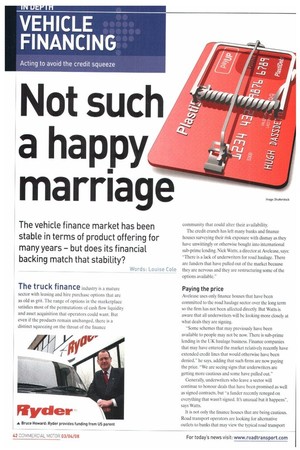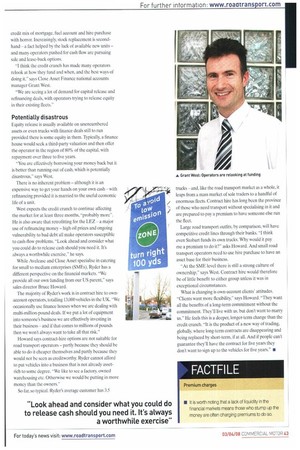Not such a happy marriage
Page 42

Page 43

If you've noticed an error in this article please click here to report it so we can fix it.
The vehicle finance market has been stable in terms of product offering for many years but does its financial backing match that stability?
Words: Louise Cole The truck finance industry is a mature sector with leasing and hire purchase options that are as old as grit. The range of options in the marketplace satisfies most of the permutations of cash flow liquidity and asset acquisition that operators could want. But even if the products remain unchanged, there is a distinct squeezing on the throat of the finance community that could alter their availability.
The credit crunch has left many banks and finance houses surveying their risk exposure with dismay as they have unwittingly or otherwise bought into international sub-prime lending. Nick Watts, a director at Avelease, says: "There is a lack of underwriters for road haulage. There are funders that have pulled out of the market because they are nervous and they are restructuring some of the options available."
Paying the price Avelease uses only finance houses that have been committed to the road haulage sector over the long term so the firm has not been affected directly. But Watts is aware that all underwriters will be looking more closely at what deals they are signing.
"Some schemes that may previously have been available to people may not be now. There is sub-prime lending in the UK haulage business. Finance companies that may have entered the market relatively recently have extended credit lines that would otherwise have been denied," he says, adding that such firms are now paying the price. "We are seeing signs that underwriters are getting more cautious and some have pulled out."
Generally, underwriters who leave a sector will continue to honour deals that have been promised as well as signed contracts, but "a funder recently reneged on everything that wasn't signed. It's unusual but it happens". says Watts.
It is not only the finance houses that are being cautious. Road transport operators are looking for alternative outlets to banks that may view the typical road transport credit mix of mortgage, fuel account and hire purchase with horror. Increasingly, stock replacement is secondhand a fact helped by the lack of available new units and many operators pushed for cash flow are pursuing sale and lease-back options.
"I think the credit crunch has made many operators relook at how they fund and when, and the best ways of doing it," says Close Asset Finance national accounts manager Grant West.
"We are seeing a lot of demand for capital release and refinancing deals, with operators trying to release equity in their existing fleets."
Potentially disastrous
Equity release is usually available on unencumbered assets or even trucks with finance deals still to run provided there is some equity in them. Typically, a finance house would seek a third-party valuation and then offer the operator in the region of 80% of the capital, with repayment over three to five years.
You are effectively borrowing your money back but it is better than running out of cash, which is potentially disastrous," says West.
There is no inherent problem although it is an expensive way to get your hands on your own cash with refinancing provided it is married to the useful economic life of a unit West expects the credit crunch to continue affecting the market for at least three months, "probably more-. He is also aware that retrofitting for the LEZ a major use of refinancing money high oil prices and ongoing vulnerability to bad debt all make operators susceptible to cash-flow problems. "Look ahead and consider what you could do to release cash should you need it. It's always a worthwhile exercise." he says.
While Avelease and Close Asset specialise in catering for small to medium enterprises (SMEs), Ryder has a different perspective on the financial markets. "We provide all our own funding from our US parent," says sales director Bruce Howard.
The majority of Ryder's work is in contract hire to ownaccount operators, totalling 13,000 vehicles in the UK. "We occasionally use finance houses when we are dealing with multi-million-pound deals. If we put a lot of equipment into someone's business we are effectively investing in their business and if that comes to millions of pounds then we won't always want to take all that risk."
Howard says contract-hire options are not suitable for road transport operators partly because they should be able to do it cheaper themselves and partly because they would not be seen as creditworthy. Ryder cannot afford to put vehicles into a business that is not already assetrich to some degree. We like to see a factory, owned warehousing etc. Otherwise we would be putting in more money than the owners."
So far, so typical. Ryder's average customer has 3.5 trucks and, like the road transport market as a whole, it leaps from a mass market of sole traders to a handful of enormous fleets. Contract hire has long been the province of those who need transport without specialising in it and are prepared to pay a premium to have someone else run the fleet.
Large road transport outfits, by comparison, will have competitive credit lines through their banks. "I think even Stobart funds its own trucks. Why would it pay me a premium to do it?" asks Howard. And small road transport operators need to use hire purchase to have an asset base for their business.
"At the SME level there is still a strong culture of ownership," says West. Contract hire would therefore he of little benefit to either group unless it was in exceptional circumstances.
What is changing is own-account clients' attitudes. "Clients want more flexibility." says Howard. "They want all the benefits of a long-term commitment without the commitment. They'll live with us, but don't want to marry us." He feels this is a deeper, longer-term change than the credit crunch. "It is the product of a new way of trading, globally, where long-term contracts are disappearing and being replaced by short-term, if at all. And if people can't guarantee they'll have the contract for five years they don't want to sign up to the vehicles for five years." III
















































































































































































